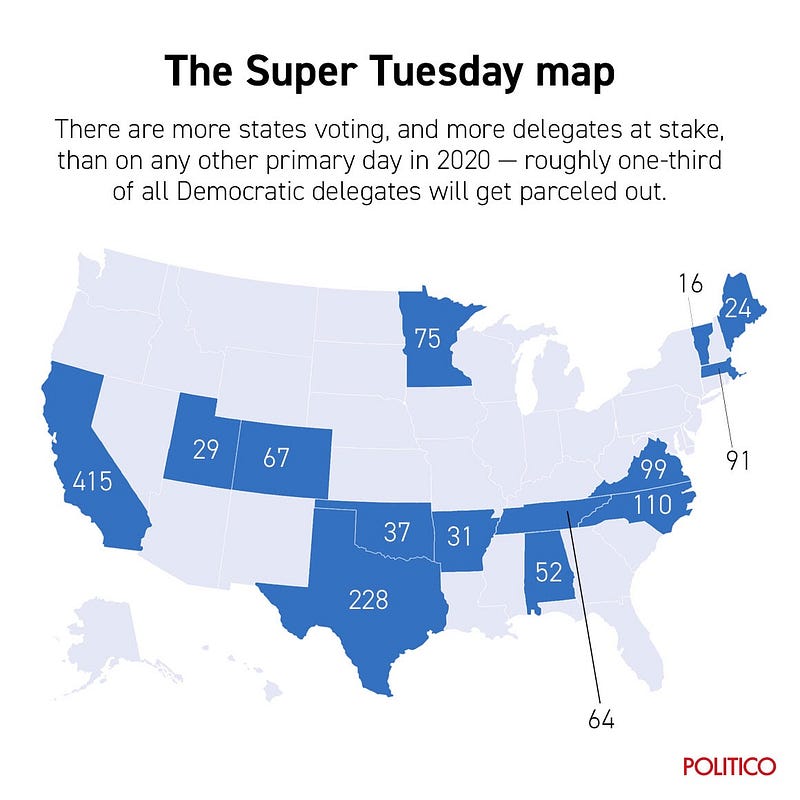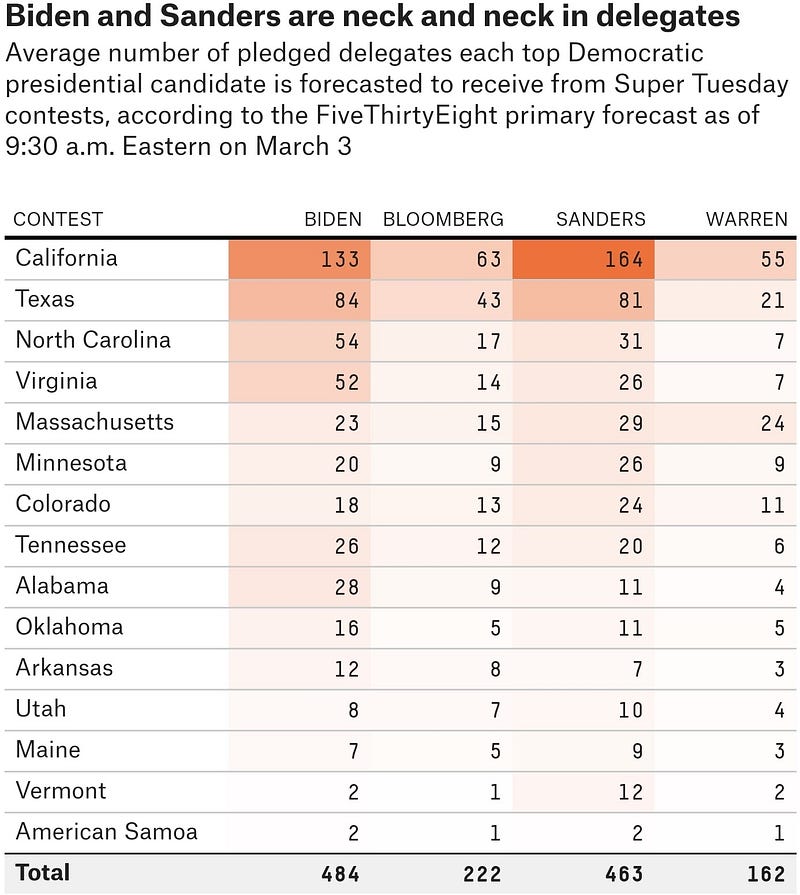Election 2020: Super Tuesday

Last month, the Democratic Primary kicked off with the Iowa Caucuses. After a month of debates and initial contests, and a culling of the candidate field, the nation finally reached Super Tuesday, the day with the most nominating contests in the primary calendar.
How does it work?

Super Tuesday featured a whopping 15 contests and a total of 1,357 delegates up for grabs. Candidates need 1,991 (out of 3,979) to secure the nomination. Since 1984, 17 out of 18 Super Tuesday winners have gone on to win their party’s nomination, meaning the day effectively determines the party’s next standard bearer.
The contests, in order of available delegates, are as follows:
- California (415)
- Texas (228)
- North Carolina (116)
- Virginia (99)
- Massachusetts (91)
- Minnesota (75)
- Colorado (67)
- Tennessee (64)
- Alabama (52)
- Oklahoma (37)
- Arkansas (31)
- Utah (29)
- Maine (24)
- Vermont (16)
- American Samoa (6)
It should be noted that while the Democrats Abroad (13 delegates) also began their contest on Super Tuesday, it will end on March 10th and thus final results will be delayed until then.
Preview
February Delegate Count for the Democratic Primary 2020. Scroll to the right or click “View larger version”!
In February, Vermont Senator Bernie Sanders emerged as the early front-runner with 54 delegates after narrow victories in New Hampshire and Nevada and second place finishes in Iowa and South Carolina. After some poor showings in the first three contests, former Vice President Joe Biden landed a decisive victory in South Carolina this past weekend, propelling him into second place heading into Super Tuesday. Former South Bend, Indiana Mayor Pete Buttigieg was in third place after an Iowa victory and being the runner-up in New Hampshire and Nevada. Massachusetts Senator Elizabeth Warren and Minnesota Senator Amy Klobuchar were fourth and fifth, respectively, while entrepreneurs Andrew Yang and Tom Steyer continued to win zero delegates. By Monday, March 2, Yang, Steyer, Buttigieg, and Klobuchar had all dropped out, with the latter two endorsing Biden alongside former candidate Beto O’Rourke.

As of Tuesday morning, Biden was the forecasted winner of Super Tuesday with an estimated 484 delegates, per FiveThirtyEight. Sanders was the forecasted runner up with 463, followed by former New York Mayor Mike Bloomberg with 222 and Massachusetts Senator Elizabeth Warren with 162.
How exactly did this play out?
Results
Results of Super Tuesday for the 2020 Democratic Primary. Scroll to the right or click “View larger version”!
Per the Associated Press (AP), Biden was projected to be the winner of Super Tuesday, pulling off nine victories in Massachusetts, Minnesota, Texas, and the South (Alabama, Arkansas, North Carolina, Oklahoma, Tennessee, Virginia). Senator Sanders won California, Colorado, Utah, and his home state of Vermont. While Maine is still being counted, Biden and Sanders were tied after 81% of precincts reporting (with Biden narrowly ahead in the popular vote). Bloomberg pulled off a victory in the American Samoa caucus. Warren, who has not won a single contest, moved into third place. Hawaii Representative Tulsi Gabbard remains in last place.
What’s Next?
March has two more major primary days on the 10th and 17th, with 6 states (352 delegates) and 4 states (577 delegates), respectively. The Northern Marianas territory (6 delegates) will vote on March 14, Georgia (105 delegates) on March 24, and Puerto Rico (51 delegates) on March 29. There are also two Democratic debates on the 6th and 15th.
Want to keep up with The PubSquare? Follow us on Twitter and Instagram!



